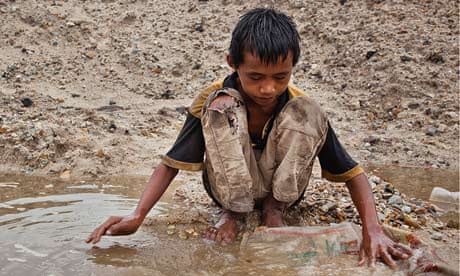- Hundreds of Indonesian fishers have seized a dredging vessel from state-owned PT Timah in protest against offshore tin mining in what they say is their fishing zone.
- The incident on July 12 is the latest development in a standoff that has been simmering since 2015, when fishers began opposing the mining in the Bangka-Belitung Islands off Sumatra.
- Tin mining is the biggest industry in Bangka-Belitung, which accounts for 90% of the tin produced in Indonesia, with the metal winding up in items like Apple’s iPhone, among others.
- But mining here, both onshore and offshore, has resulted in extensive forest degradation and deforestation, been associated with worker fatalities and child labor, and been tainted with corruption.
This article originally appeared in Mongabay.
Featured image: Febri, a 15-year-old tin miner. Photograph: Ulet Ifansasti/Friends Of The Earth
JAKARTA — Hundreds of Indonesian fishers protesting against an offshore tin mining operation in Sumatra have seized a dredging vessel they deemed to be operating within their fishing zone.
The development on July 12 is the latest escalation in a standoff simmering since 2015, when fishers in the Bangka-Belitung Islands began opposing mining by state-owned company PT Timah along the 70-kilometer (43-mile) Matras-Pesaren coastline.
Despite the years of opposition, Timah continues to mine, which the government has deemed it is legally permitted to do. As of July 13, the group of around 300 fishers still had control of the Timah dredging vessel.
The fishers say the mining has had a detrimental impact on the underwater ecosystem, which has subsequently reduced their catches. They have also complained of fuel and metal waste from the dredging vessel being dumped into the sea. The fishers have brought their grievances before local and national government officials, but say that in return they have been subjected to intimidation and criminalization.
“We can’t just stay quiet because our families will die of hunger if the sea gets destroyed,” Suhardi, head of the group Traditional Fishers for the Environment (NTPL), said as quoted by local newspaper Kompas.
Timah is said to have reported the seizure of its vessel to the mining ministry and might file a police report as well.
Indonesia is one of the world’s top producers of tin, mining 90% of it in the Bangka-Belitung Islands off the southwestern coast of Sumatra. Tin mining has long been the islands’ main economic driver. However, tin mining, both onshore and offshore, has resulted in extensive forest degradation and deforestation, impacting particularly tens of thousands traditional fishers whose livelihoods depend on the sustainability of coastal and marine ecosystems, according to the Mining Advocacy Network (Jatam).
Jatam calculates that three-quarters of Bangka-Belitung’s total area of 1.6 million hectares (4 million acres) has been licensed out as tin-mining concessions. Nearly two-thirds of that total area is considered to be either damaged or critically degraded, it adds.
Mining has also proven deadly for workers, and exploitative for local children. The Indonesian Forum for the Environment (Walhi), the country’s biggest green NGO, recorded 40 deaths linked to the tin mines between 2017 and 2020, more than half of them in 2019 alone. In 2014, a BBC documentary traced the solder used in Apple’s iPhones to tin mined by children in Bangka.
Tin mining in Bangka-Belitung is also heavily tainted by corruption: Indonesia’s antigraft agency, the KPK, has found irregularities in more than half of the 1,085 business permits issued in the province. Indonesia Corruption Watch (ICW), an NGO, also reported 68 trillion rupiah ($4.7 billion) in tax, reclamation costs, royalties, export taxes and other revenue that the state failed to claim between 2004 and 2014 from the province’s tin industry.
“This is an emergency. The local and state governments must do their part and resolve this problem,” Merah Johansyah, national coordinator of Jatam, said as quoted by Kompas.

